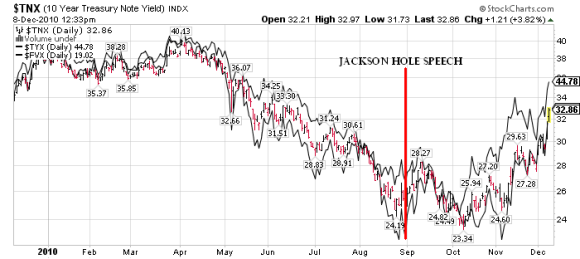Monetary policy is a powerful tool due to the explicit control the Fed has over the interest rate paid on short-term instruments. In a normal economic environment a cut in the overnight rate would help generate demand for loans and result in economic growth via the interest rate channels. This control over the short end of the curve generally extends through the entirety of the curve to varying degrees. Thus, theoretically, the Fed can always generate demand for debt regardless of the loan duration. If we were not in a balance sheet recession I presume monetary policy would be more effective than it has been.
The beauty of controlling the overnight interest rate is that the Fed actually controls it. When the Fed sets their interest rate target for overnight loans (at the much hyped FOMC Meetings) they are essentially warning the market that they are willing to buy all outstanding paper at that rate. In other words, bet against us if you dare! This is not exactly the same as what they’re doing under QE. Although they’re simply buying longer dated securities they are not explicitly telling the market that they are willing buy whatever amount it takes in order to meet a specific rate.
When Ben Bernanke initiated his policy of QE2 he explicitly stated that his intention was to suppress long-term rates and create demand for loans. What he’s done instead is created a panic about inflation and money printing. In the end, there is little evidence that QE2 is having any sort of positive effect aside from the obvious market stabilizing impact of QE1 inside the highly unusual crisis period. It has not driven the dollar down, there is no such thing as a wealth effect in the stock market and input costs have surged. Most importantly, there is only weak evidence that QE is the cause of low interest rates.
The problem here is that the Fed doesn’t truly control the long end of the curve because they effectively allow the market to set long-term interest rates. As you can see below the market has essentially taken the other side of the Fed’s position since the Jackson Hole Speech. In other words, the Fed is failing in their efforts to suppress long-term rates. QE2 is still not working.
In order for the Fed to keep long-term rates at a target rate they would need to target that rate explicitly and be willing to bid at that level no matter what. Since the US government is the monopoly supplier of US T-Bonds the Fed should be able to substantially influence the long rates which should have a direct impact on mortgage rates and other long end borrowing costs. It would essentially be taken by the media as “QE ad infinitum” and I personally think Ben Bernanke is terrified of the potential impacts of such a policy or (unlikely) does not understand that this is what’s required. But again, the public would likely be outraged as the media and supposed “monetary experts” would tell us all that this was “debt monetization” and “money printing”. Who knows what the behavioral response would be in this environment? Therefore, any such move would have to be measured and gradual.
The most important point is, without such a measure, the Fed will continue failing in its attempts to control long-term rates and QE2 will continue to have little to no positive impact on the overall economy.
Mr. Roche is the Founder and Chief Investment Officer of Discipline Funds.Discipline Funds is a low fee financial advisory firm with a focus on helping people be more disciplined with their finances.
He is also the author of Pragmatic Capitalism: What Every Investor Needs to Understand About Money and Finance, Understanding the Modern Monetary System and Understanding Modern Portfolio Construction.

